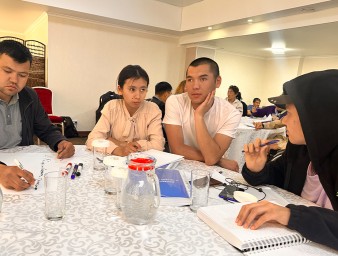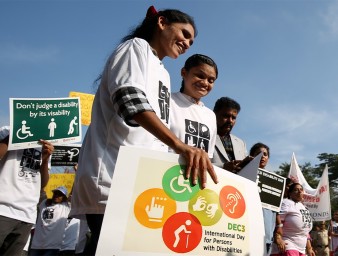The right to take risks and make mistakes: equal recognition before the law for people with disabilities
15 May 2014

In its first General Comment, the Committee on the Rights of Persons with Disabilities says there has been a “general failure” to understand that there has been a shift from away from the idea that people with disabilities have decisions made for them, to a human rights-based view that is based on supported decision-making.
The General Comment deals specifically with Article 12 of the Convention on the Rights of Persons with Disabilities which affirms that all persons with disabilities have full legal capacity, with no exceptions. The Committee says that whilst historically, many groups have been refused this right, persons with disabilities “remain the group whose legal capacity is most commonly denied in legal systems worldwide.”
People with disabilities are frequently subjected to “substituted decision-making” via guardians or through mental health laws which permit forced treatment, for example.
Speaking on behalf of the Committee, Theresia Degener said, “People with disabilities, including those with psychosocial or cognitive impairments, must be supported in making decisions, and not have decisions made for them, even when it is thought to be in their ‘best interests’.”
General Comments are regularly published by the treaty monitoring bodies, the committees that oversee the human rights conventions. They are the result of a wide process of consultation and, although not legally binding, are regarded as important legal references for interpretation and implementation of specific aspects of the treaties.
The Committee stresses in its General Comment that civil, political, economic, social and cultural rights cannot be fully exercised if legal capacity is denied. The right to vote, the right to marry and found a family, reproductive rights, parental rights, the right to give consent for intimate relationships and medical treatment, and the right to liberty are all are all beyond the reach of people who do not have equal recognition before the law.
Those individuals with cognitive and psychosocial disabilities have been affected more than others by “substituted decision-making regimes and denial of legal capacity”, the Committee says.
Whilst the concept of “mental capacity” is highly controversial, the General Comment notes that, under Article 12 of the Convention, “perceived or actual deficits in mental capacity must not be used as justification for denying legal capacity.” It falls upon States, it says, to ensure that support is provided “in the exercise of legal capacity.”
Support itself is a concept which requires judgement. The General Comment discusses “undue influence” and says protection of the right to exercise legal capacity must also include respect for the preferences of the individual, including “the right to take risks and make mistakes.”
The General Comment offers examples of how inequality before the law adversely affects a range of other human rights, including detention of persons with disabilities in institutions without their consent, forced treatment in psychiatric and other institutions and the denial of citizenship to children with disabilities.
The right to vote on the basis of perceived or actual psychosocial or intellectual disability continues to be refused in many countries, however, the General Comment says that “a person’s decision-making ability cannot be a justification for any exclusion of persons with disabilities from exercising their political rights, including the right to vote, the right to stand for election and the right to serve as a member of a jury.”
Degener says the Committee hopes that Member States will use the General Comment in reviewing their laws and practices to achieve greater recognition of the human rights of people with disabilities.
The General Comment recommends that governments take steps to abolish substitute decision-making regimes for persons with disabilities and replace them with a broad range of supports to facilitate the exercise of legal capacity.
15 May 2014



